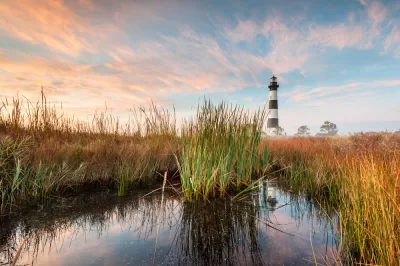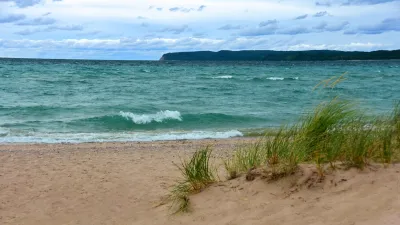The concept of ‘natural capital’ calls on policymakers to consider the value of natural infrastructure, which can often improve climate resilience without expensive construction projects.

In the April 2023 issue of Scientific American, the editors draw attention to how nature can be a tool for fighting the impacts of climate change. The article outlines the dangers of prioritizing development—including climate and weather mitigation measures such as levees or seawalls—over preserving natural features that can prevent erosion, limit the impact of flooding, and make coastal areas more resilient.
“Wetlands, coastal plains, sand dunes, forests, and many other permeable surfaces do cheaply (or even for free) what engineered levees, seawalls and pumps do at a cost of billions of dollars,” the editors explain. “They are vital infrastructure that makes us more resilient against climate change, and the cost of destroying them or weakening their ability to function must be factored into the decisions we make to build and grow.”
The article highlights the concept of “natural capital,” “the idea that ecosystem services should be valued in a similar manner as any form of wealth.” Because the economic value of nature—aside from usable resources like lumber and ore—has not been factored into policy decisions, may ecosystems have vanished. While it may seem crass to put a dollar value on what many consider priceless natural treasures, the editors argue we are at a point where it is necessary because “developers have long conflated pricelessness with worthlessness, allowing them to profit without paying for the consequences of destroying the environment.”
The article concludes, “Economic value is never the only reason nature is worth preserving; it is simply a powerful, underused tool to help us make decisions about how to live more sustainably in a climate-changed world.”
FULL STORY: Use Nature as Infrastructure

Alabama: Trump Terminates Settlements for Black Communities Harmed By Raw Sewage
Trump deemed the landmark civil rights agreement “illegal DEI and environmental justice policy.”

Study: Maui’s Plan to Convert Vacation Rentals to Long-Term Housing Could Cause Nearly $1 Billion Economic Loss
The plan would reduce visitor accommodation by 25% resulting in 1,900 jobs lost.

Planetizen Federal Action Tracker
A weekly monitor of how Trump’s orders and actions are impacting planners and planning in America.

Wind Energy on the Rise Despite Federal Policy Reversal
The Trump administration is revoking federal support for renewable energy, but demand for new projects continues unabated.

Passengers Flock to Caltrain After Electrification
The new electric trains are running faster and more reliably, leading to strong ridership growth on the Bay Area rail system.

Texas Churches Rally Behind ‘Yes in God’s Back Yard’ Legislation
Religious leaders want the state to reduce zoning regulations to streamline leasing church-owned land to housing developers.
Urban Design for Planners 1: Software Tools
This six-course series explores essential urban design concepts using open source software and equips planners with the tools they need to participate fully in the urban design process.
Planning for Universal Design
Learn the tools for implementing Universal Design in planning regulations.
Caltrans
Smith Gee Studio
Institute for Housing and Urban Development Studies (IHS)
City of Grandview
Harvard GSD Executive Education
Toledo-Lucas County Plan Commissions
Salt Lake City
NYU Wagner Graduate School of Public Service





























